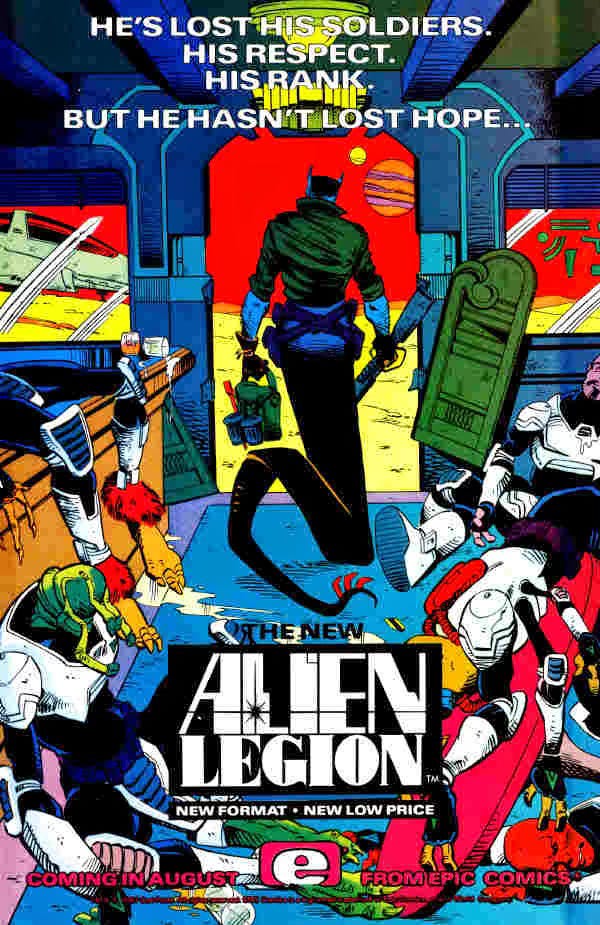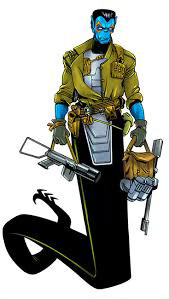Sonder: The profound feeling of realizing that everyone, including strangers passing in the street, has a life as complex as one's own, which they are constantly living despite one's personal lack of awareness of it. - Dictionary of Obscure Sorrows
I remember seeing the ad. It stuck with me even as the details got hazy with time. “He’s lost his soldiers, his respect, and his rank. But he hasn’t lost his hope.” I was hooked.
My memory has become a thing of tragic wisps and shadows. I would have sworn up and down, back and forth, from side to side that Alien Legion had been an Eclipse title. I was shocked to find out it was a Marvel title. K-i-i-i-nd of.
Alien Legion was originally published by Marvel’s late and much-lamented 1980s indie(ish) imprint, Epic Comics. My memory’s mistake was understandable, the two were very much alike. ChatGpt does the same thing when it’s filling in the gaps.
Epic was an attempt to claw back some of the market share Marvel had been losing to the new kids in town. It offered creator ownership and even creator control (which is vastly more important. Epic Comics had started life as Epic Illustrated magazine. Calling it a “Magazine” was a way to get around the Comic Book Code, it was meant to be a competitor of Heavy Metal but was too American to be that.
You can see a lot of Epic Illustrated’s DNA in titles like Alien Legion. Carl Potts was trying to break into comics as an artist back when that wasn’t an admission of tragic life choices. Back then it was smarter to submit a wholly original idea rather than reinterpret an existing IP that people already had strong opinions on. It worked, Potts went to work on Marvel’s mainstream franchises but couldn’t get his pitch meeting idea out of his head. After making a more serious effort with it, Archie Goodwin at Epic picked it up.
The concept was simple but intriguing. A space opera with a French Foreign Legion that was mostly aliens.
Potts had a 20-issue run from 1984-1987. It had done well but it was felt that it could have done better. Characters had been given to stating and restating their tragic backstories. Worse, were the tell don’t show thought balloon exposition dumps.
The series was reworked and Epic brought in a writer, (which I can’t recommend enough if you want to tell a story), The Legend Chuck Dixon.
Dixon was what this title desperately needed. His genius is his ability to add emotional depth to characters without sacrificing action. Characters that had been just a bit flat before suddenly found shades and nuisances that you wouldn’t normally see in space opera.
Chuck Dixon turned Alien Legion from Star Wars light into a genuine military science fiction series.
The Nomads world began to acknowledge their personal struggles as well as having to operate in a world, where, as the most expendable outfit in the most expendable of the armed forces, they would face the probability of getting the worst of the worst assignments on a good day and outright betrayal on bad ones.
A soldier’s morally complex decisions were starting to be made and their impacts felt. Sometimes there is no good choice to be made, and worse times when no choice is less bad than any of the others.
The one choice that none of them can make is to ever abandon their brothers.
Major Sarigar: their tough-as-nails commander who throws away his entire career at the start of Disxon’s run to bring his Nomads back from the hell they were left to die in. (He’s the snake guy).
Jugger Grimrod: A born killer with a heart of … well, gold isn’t the right metal. Radioactive lead is nearer the mark.
Tamara: 347 confirmed kills. Decorated for Gallantry. And a loving mother.
Meico: The team’s medic. A telepathic and an empathetic who is being crushed by the suffering of his unit.
Chuck Dixon did wonders with these characters. They turned from sketches on paper into people you cared about. Worried about.
Larry Stroman is the artist who is inextricably tied to this title as the other half of Dixon. His visuals brought a visceral style of storytelling to Alien Legion. It moved this space opera away from Star Wars and closer to Hammer’s Slammers.
The Legend was able to so something quite unique with Alien Legion. He was able to tell every story in a war story. The roster of point-of-view characters was limited but each one had his or her own tale to tell. The hard-bitten veteran who is secret terrified before every op. The angry young officer more desperate to prove something to his father than to himself, and then his father is killed. The lynchpin that everyone is counting on and he doesn’t think he can keep it together any longer. And the commander who loves all of them like a professor loves his students or perhaps more as a father loves his sons and must keep sending them out to be killed time and again.
It’s stories like these that have kept Chuck Dixon’s Alien Legion as a cult favorite with comics readers.
Dixon’s original run with the series ran for eighteen issues and ended in 1990. However, he has returned to the Nomads repeatedly over the years in various mini-series like Alien Legion: On the Edge, Alien Legion: Tenants of Hell, Alien Legion: Binary Deep, and Alien Legion: One Planet at a Time. A few characters, most especially the tough-as-nails Jugger Grimrod got their own limited-run titles.
While it has been out of publication it has never been out of memory for its fans. In 2014 Alien Legion: Uncivil War was published by Titan Comics, again with Chuck Dixon and inked by Stroman and Potts.
Alien Legion is frequently cited as the longest-running title to have come out Epic Comics. It still has enough of a following today that an Alien Legion movie has been greenlit.
Darklings: You said it was originally published by Marvel. Is Disney going to be ruining this one?
The Dark Herald: Mickey the Great and Terrible is not connected to the project.
Darklings: Oh, thank Glob!
The Dark Herald: It’s being made by Warner Brothers
Darklings: That was mean!
The Dark Herald: I quite agree.
Discuss in the comments below.












